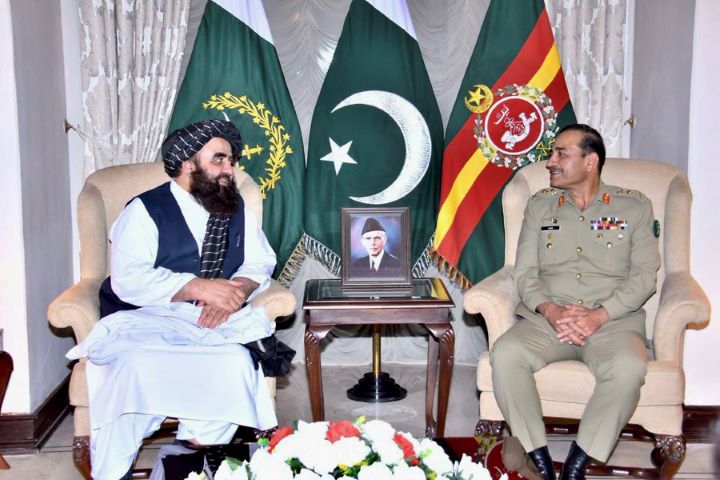

File photo of Taliban's Acting Foreign Minister Amir Khan Muttaqi and Pakistani Army Chief General Asim Munir at the Army House in Rawalpindi (Photo: Pakistan Ministry of Foreign Affairs)
The verbal war between Pakistan and Afghanistan over terrorism and the implementation of the Doha Agreement intensified over the weekend. In a tweet on Sunday, Pakistani Defence Minister Khawaja Asif retorted that the country has the “will to reign in militants from within its borders”, meaning that even without Kabul’s cooperation, it will battle the terrorists operating from Afghanistan.
Asif was responding to Taliban spokesperson Zabihullah Mujahid, who had on Saturday said that the Taliban had signed the Doha peace agreement with the US {and not with Pakistan}, adding that the Afghan soil was not being used against Pakistan which is “a brotherly and Muslim country”. Mujahid, who made his comments to BBC Pashto, also said that the Taliban government will not allow attacks by the Pakistani Army, saying “we will not allow anyone to encroach on our territory”.
In one of the biggest attacks faced by the Pakistani Army in a single day, it lost at least 12 soldiers after an insurgent group stormed the Zhob garrison in northern Balochistan and lost another three soldiers in a separate assault in the Dera Bugti district.
Following the high death toll among soldiers, Pakistani Army chief, Gen. Asim Munir visited Quetta Garrison and met with the injured soldiers at the Combined Military Hospital. In a statement the army said: “The involvement of Afghan nationals in acts of terrorism in Pakistan is another important concern that needs to be addressed. Such attacks are intolerable and would elicit an effective response from the security forces of Pakistan”, reports Dawn.
The Doha Agreement, which was signed between the Taliban and the Donald Trump government in February 2020, sought to withdraw American and NATO forces if the Taliban stopped attacks. It is largely believed that while the US withdrew its troops in line with the pact, the Taliban conversely stepped up its attacks. The then government of President Ashraf Ghani was not a party to the Doha Agreement, signed in Qatar.
Last week, Pakistan sought to remind the Taliban about the Doha Agreement in a bid to persuade it to restrain the TTP fighters who are believed to be close to the Taliban regime. The Tehreek-e-Taliban (TTP) has unleashed a violent campaign against Pakistan to convert it into a Sharia-compliant State. Hundreds of Pakistani security personnel from the police, the paramilitary forces and even the army have been killed by the TTP.
The Pakistani Defence Minister was only reiterating his army’s position on the TTP and its links to cross-border terrorism. The border forces of the two nations have clashed often on their restive border, called the Durand Line.
An enraged Asif said: “Afghanistan is neither fulfilling its obligation as a neighbouring and brotherly country nor safeguarding the peace agreement”. He also lamented the fact that Pakistan has been providing shelter to millions of Afghan refugees displaced by the war, even as terrorists who shed Pakistani blood find refuge on Afghan soil.
The governments in Islamabad and Kabul have been at loggerheads soon after the Taliban seized power in August 2021. The initial euphoria at seeing an ally in Kabul vapourised after TTP terrorists moved into Pakistan’s border regions from Afghanistan and began to target Pakistani security forces.
Many Pakistani ministers including the deputy Foreign Minister, the Interior Minister and Asif have repeatedly warned the Taliban government to stop the TTP otherwise Pakistan will cross the border to retaliate against its former ally. Pakistan’s assertions have been met with equal contempt by the Taliban government on previous occasions.
The TTP has been targeting the security forces in the south-western Balochistan province as well as the north-western Khyber Pakhtunkhwa region.
The situation has been so dire for Pakistan that in an unusual act, the country’s National Security Committee (NSC) met twice within a week in January 2023 to take stock of the deteriorating security situation under the leadership of Prime Minister Shehbaz Sharif, where Pakistan resolved to fight cross-border terror.
India's largest automobile in-plant railway siding at Maruti Suzuki's Manesar facility started operation on Tuesday,…
Google on Tuesday unveiled its Safety Charter for India's AI-led transformation, at the "Safer with…
The human rights organisation of the Baloch National Movement (BNM), Paank, has published its most…
The Israel Defence Forces (IDF) on Tuesday claimed that it has killed Iran's senior-most military…
Amid escalating conflict between Iran and Israel, the Ministry of External Affairs (MEA) on Tuesday…
Amid the escalating tensions between Israel and Iran, Indian Embassy in Iran has asked all…